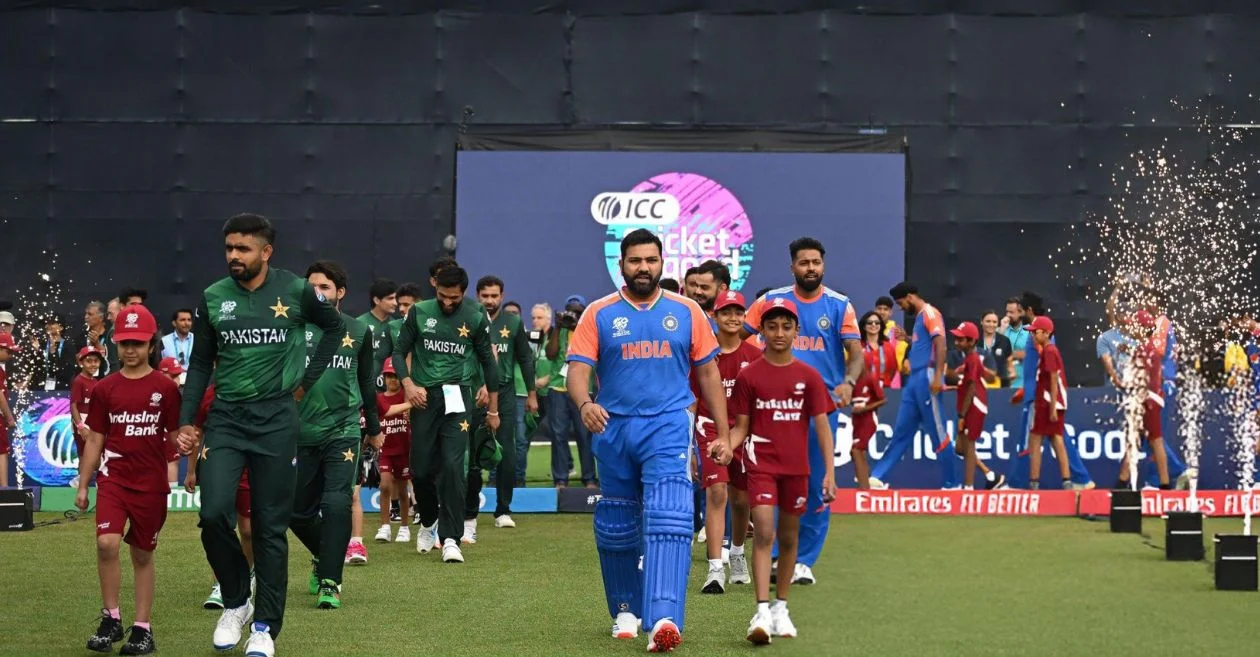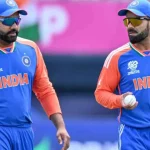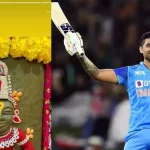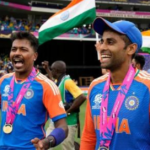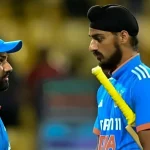There are rivalries in sport—and then there’s India vs Pakistan, a fixture that transcends cricket and touches the very soul of two nations. From packed stadiums to silent streets, from midnight watch parties to soaring TRPs, this is more than just a game. It’s a legacy, a history, and a heartbeat that pulses through billions across borders.
Yet, for all its emotional gravity, the contest is now shackled by forces far beyond the 22 yards. Political tensions, diplomatic cold shoulders, and now, a horrific terror attack in Kashmir on April 22, have cast fresh shadows over any prospect of bilateral ties between the two sides. The Board of Control for Cricket in India (BCCI) has reportedly taken a firm stance, with rumors swirling that it has urged the International Cricket Council (ICC) to avoid grouping India and Pakistan together in ICC tournaments moving forward.
As of now, these reports remain unverified. But they’ve already triggered a storm of speculation, anxiety, and opinion. And once again, cricket becomes both a casualty and a symbol in the larger theatre of geopolitics.
The Kashmir Attack: A Turning Point in Cricket Diplomacy
The recent terror attack in Kashmir, where 26 innocent tourists lost their lives in a hail of bullets fired by Pakistan-based terrorists, has reignited India’s long-standing policy of non-engagement with Pakistan on the bilateral cricketing front. The tragedy, which shook the nation, was swiftly condemned by political leaders, citizens, and sports communities alike.
Speaking to Aaj Tak, BCCI Vice-President Rajiv Shukla made the board’s position clear:
“We are with the victims and we condemn it. Whatever our government will say, we will do. We don’t play with Pakistan in bilateral series because of the government stand. And we will not play with Pakistan in bilaterals going forward. But when it comes to ICC events, we play due to ICC engagement. ICC is also aware of whatever is happening—they will look into it.”
Shukla’s words struck a chord. They acknowledged the pain of the nation while reiterating India’s rigid yet consistent cricketing policy—no bilateral cricket with Pakistan until the political climate changes.
A History of Fractured Relations
India and Pakistan last played a bilateral cricket series over a decade ago, in 2012-13, when Pakistan visited India for a short limited-overs tour. The tour saw some emotionally charged yet memorable cricketing moments—but it was also the last time the two nations faced off outside ICC or ACC events.
Since then, all matches have been limited to neutral venues and multinational tournaments, such as the ODI World Cups, T20 World Cups, Champions Trophies, and the Asia Cup. The last time India toured Pakistan was for the 2008 Asia Cup, and since then, political relations have worsened significantly, particularly following the 26/11 Mumbai attacks and the Pulwama attack in 2019.
India’s stance remains unwavering: no bilateral cricket until cross-border terrorism ends. Pakistan, on the other hand, has often expressed its disappointment, claiming cricket should remain above politics. But when the political conflict claims innocent lives, the argument for sport as a diplomatic bridge loses its footing.
The ICC Women’s Cricket World Cup: A New Dilemma
The next ICC event is scheduled later this year—the ICC Women’s Cricket World Cup 2025, to be held in India. Pakistan’s women’s team has qualified for the tournament, which is structured in a round-robin format where each team plays every other team once.
However, given the recent attack and mounting tensions, the BCCI is reportedly working on an alternative plan: scheduling Pakistan’s matches in a neutral venue, possibly the UAE or Sri Lanka. The final decision is still pending and is expected to involve consultation with the Indian government, ICC officials, and Pakistan Cricket Board (PCB) representatives.
This raises complex logistical and ethical questions:
-
Should Pakistan be allowed to play in India at all?
-
If their matches are moved abroad, is it fair to other teams?
-
Could this set a precedent that affects future ICC tournaments?
These are not merely administrative questions—they’re reflections of the current regional climate, where security and symbolism often override sporting traditions.
Asia Cup 2025: Déjà vu All Over Again?
Before the Women’s World Cup, the next major showdown lies in September 2025, when the Asia Cup is scheduled to be hosted by India. Or is it?
As per emerging reports, the Asian Cricket Council (ACC) may once again opt for a hybrid or neutral venue model, similar to what was done in 2023. That year, while Pakistan retained nominal hosting rights, India refused to travel, and their matches were relocated to Sri Lanka.
The ACC, currently chaired by Pakistan’s Mohsin Naqvi, recently signed a lucrative $170 million media rights deal covering four Asia Cup editions. The deal was largely predicated on the guaranteed presence of India vs Pakistan clashes—matchups that drive astronomical viewership and revenues.
If India insists on playing matches outside of Pakistan—or even outside India in 2025—the ACC may be forced into another hybrid compromise. While fans grumble about neutral venues draining the passion out of such contests, the alternative—no India-Pakistan match at all—is even harder to digest for broadcasters and fans alike.
Bilateral Cricket: A Long Drought and No End in Sight
It’s worth reflecting on how deep this drought runs.
-
Last bilateral series: 2012-13 (India hosted)
-
Last Test match: 2007 (India toured Pakistan)
-
Last Indian tour of Pakistan: Asia Cup 2008
-
All interactions since: Limited to ICC and ACC events
Cricketing legends from both sides—Wasim Akram, Sunil Gavaskar, Shahid Afridi, Rahul Dravid—have, over the years, expressed hope that cricket could serve as a soft diplomacy tool. But reality continues to disagree.
India’s firm stance that “terror and cricket cannot go hand-in-hand” has grown stronger in recent years. The memories of Pulwama, Uri, and now the Kashmir tourist attack, have only deepened the trust deficit.
Meanwhile, Pakistan, which has hosted several bilateral series with other countries recently, feels ostracized. PCB officials, including past chairmen like Najam Sethi and Ramiz Raja, have often criticized India’s unwillingness to engage, but they, too, understand that these decisions are not in the hands of cricket boards alone.
The Business of a Blockbuster
No one can deny that India vs Pakistan is cricket’s biggest box office event. Every time they meet, records shatter:
-
Over 500 million people watched their match in the 2023 ODI World Cup.
-
Social media engagement tops 1 billion impressions during IND vs PAK weeks.
-
Brands line up, with sponsorship packages sold out within hours.
In many ways, the business of this rivalry runs on its rarity. The scarcity fuels the hunger. But even broadcasters are now growing anxious. If political circumstances keep threatening these clashes, can long-term broadcasting deals survive?
This conundrum places pressure on cricketing bodies to re-imagine how they market and schedule these iconic matchups—without compromising on safety, ethics, or sentiment.
Voices from the Game: What Cricketers Say
Many former players have spoken candidly about the absence of bilateral cricket:
Virat Kohli, after the 2022 T20 World Cup: “It’s always a high-pressure game. We enjoy it, but we’d love to play them more often.”
Babar Azam, in an interview: “We’ve always believed that sports should bring people together. But we also understand the realities.”
Sourav Ganguly, as BCCI President: “We’re always guided by government policy. Cricket boards can’t act independently in these matters.”
The mutual respect between players is often heartening. During ICC events, moments like Kohli hugging Rizwan, or Babar applauding Indian players, remind us that the players see beyond the political divide.
What Lies Ahead?
The future of India-Pakistan cricket remains uncertain—but it’s not bleak. Here’s what we know:
1. No Bilaterals for Now
BCCI’s position is aligned with the Indian government. Bilateral series are off the table for the foreseeable future.
2. ICC & ACC Events Continue
India and Pakistan will continue to meet in ICC and ACC tournaments—but only if drawn together or when formats demand it.
3. Neutral Venues Are the New Normal
Until geopolitical tensions ease, neutral venues will remain a logistical necessity.
4. Cricket as a Symbol
While cricket won’t solve political problems, it remains a powerful symbolic platform—a shared love in divided lands.
A Rivalry Under Siege, But Not Forgotten
India vs Pakistan is more than a match. It is war minus the shooting, celebration minus the borders, emotion minus the politics—until real life forces its way in.
The recent terror attack has reminded the world that cricket doesn’t exist in a vacuum. It breathes the air of its time, carries the burden of its politics, and often bleeds for the very people who worship it.
For now, the rivalry continues—but with distance, caution, and compromise. The stadiums may roar again. The flags may flutter in opposition once more. But until then, the most electric contest in world cricket remains on a delicate edge—one that only peace can stabilize.
Please check for information on the best betting sites in India – https://selectory.org/best-betting-sites/
